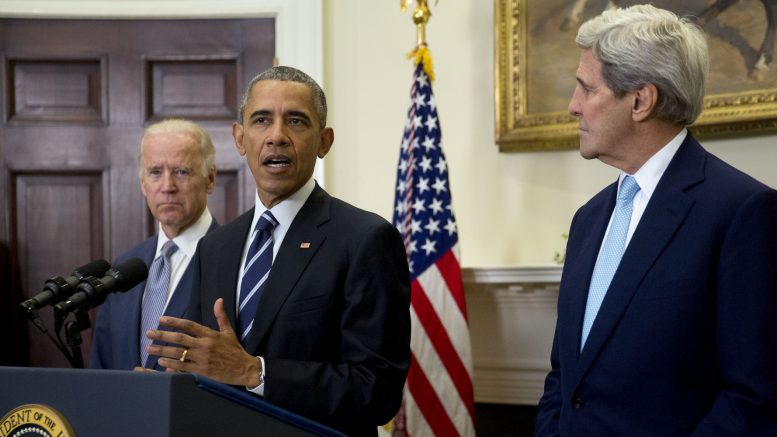While President Barack Obama, Prime Minister Justin Trudeau and President Peña Nieto, the three “amigos” of North America, are meeting in Canada, TransCanada Pipelines has filed a $15-billion lawsuit against the government of the United States. Citing chapter 11 of NAFTA (North America Free Trade Agreement), TransCanada alleges that the refusal to allow the construction of its Keystone XL pipeline is mere political posturing in favour of climate change; TransCanada claims that the Obama administration failed to protect the investments of a Canadian company.
Of course, TransCanada is referring to ISDS (Investor State Dispute Settlement) clauses in the free trade agreement signed in 1992 by the three countries. Trade agreements between countries are a good thing when they help the economy, but one must be wary of the fine print of such clauses that give precedence to foreign investors over the rights of citizens to nurture their democratic values.
The public affair program Backlight of VPRO TV (Netherlands) aired an excellent analysis of the stakes of ISDS last October — the title “Might is Right” gives a good idea of the overwhelming weight of these fine-print clauses which can effectively negate the right of duly elected officials to act in the best interest of their citizens.
The starting point of this 50-minute analysis is the $250-million lawsuit filed by Lone Pine Resources. This company had a gas claim under the bed of the St. Lawrence River between Montreal and Quebec City. In June 2011, the government of the province of Quebec forbade drilling and fracturing under the waters of this vital waterway. In retaliation, Lone Pine sued not only for the loss of potential revenue (in case it should have found a substantial deposit of gas), but also to effectively punish the government because it acted to protect the drinking water of its citizens and the fisheries of the Gulf of St. Lawrence.
In effect, Lone Pine turned the system of justice into a system of “legal and financial terrorism” wherein a foreign investor can blackmail a duly elected government which wants to protect the health, safety and economic welfare of its citizens. When Canada, Mexico and the United States signed these ISDS clauses, they signed away a good part of their sovereignty.
President Obama rejected Keystone XL because he was convinced it was not “in the best interest” of his country. With many options possible, his administration chose one course of action for the good of the nation. Future historians will decide if he made the right decision. As in any public policy made for the common good, some people are happy with this decision, others are not. Such are the political realities of a free and democratic country.
Unhappy with this decision, TransCanada Pipelines chose to directly challenge the sovereignty of the government of the United States with this $15-billion lawsuit. Presently, as an alternate to Keystone XL to the south, TransCanada would bring Alberta tar sands oil to the Atlantic seaboard with the 4,600-kilometre Energy East pipeline which is expected to cost $16 billion. If successful, this lawsuit would mean that the taxpayers in the USA would pay 94 per cent of the cost of the Energy East pipeline!
This is basically “taxation without representation,” something that George Washington, Benjamin Franklin, Thomas Jefferson and the founders of the United States of America would find totally unacceptable.
These ISDS clauses, the fine print found in trade deals such as NAFTA, the TransPacific partnership and the trade agreement project with the European Union, seriously undermine the basic principle that democracy is “government of the people, by the people and for the people.” In democracies such as Canada or the USA, foreign investors such as TransCanada Pipelines or Lone Pine Resources should not hold the duly elected governments as hostage to their greed!
MORE ON HUFFPOST:
U.S. President Barack Obama and Prime Minister Justin Trudeau hug as the president leaves Parliament Hill on Wednesday, June 29, 2016.
U.S. President Barack Obama addresses Parliament in the House of Commons on Wednesday, June 29, 2016.
Prime Minister Justin Trudeau and his wife Sophie Gregoire Trudeau share a laugh with U.S. President Barack Obama after his address
U.S. President Barack Obama is greeted by children as he arrives on Parliament Hill on Wednesday, June 29, 2016.
U.S. President Barack Obama signs the guest book during a welcome ceremony after arriving on Parliament Hill in Ottawa, as Speaker of the House of Commons Geoff Regan, Prime Minister Justin Trudeau and his wife Sophie Gregoire Trudeau and Speaker of the Senate George Furey look on, Wednesday, June 29, 2016.
Prime Minister Justin Trudeau, Mexican President Enrique Pena Nieto and U.S. President Barack Obama take part in the closing press conference of the North American Leaders’ Summit at the National Gallery of Canada.
U.S. President Barack Obama, Prime Minister Justin Trudeau and Mexican President Enrique Pena Neito stand in front of Parliament Hill for a group photo during the North America Leaders’ Summit at the National Gallery of Canada.
Prime Minister Justin Trudeau, Mexican President Enrique Pena Nieto and U.S. President Barack Obama take part in the North American Leaders Summit at the National Gallery of Canada in Ottawa on Wednesday, June 29, 2016.
Prime Minister Justin Trudeau welcomes U.S. President Barack Obama to the North American Leaders’ Summit in Ottawa, Wednesday June 29, 2016.
U.S. President Barack Obama talks with Governor General of Canada David Johnston on the tarmac upon his arrival at Ottawa Macdonald-Cartier International Airport on Wednesday, June 29, 2016.
Prime Minister Justin Trudeau, his wife Sophie Gregoire Trudeau and Mexican President Enrique Pena Nieto pose for a photograph along with Governor General David Johnston and his wife Sharon Johnston before attending a state dinner in honour of the Mexican President at Rideau Hall the official residence of the Governor General in Ottawa, Tuesday June 28, 2016.
Prime Minister Justin Trudeau and Mexican President Enrique Pena Nieto toast Governor General David Johnston at a state dinner in honour of the Mexican President at Rideau Hall the official residence of the Governor General in Ottawa, Tuesday June 28, 2016.
Prime Minister Justin Trudeau answers a question as Mexico’s President Enrique Pena Nieto listens during a Q&A with youth at the Museum of Nature, on Tuesday, June 28, 2016 in Ottawa.
Prime Minister Justin Trudeau and Mexican President Enrique Pena Nieto start the day with a run across the Alexandra Bridge from Ottawa to Gatineau, Quebec on Tuesday, June 28, 2016.
Prime Minister Justin Trudeau meets with Mexican President Enrique Pena Nieto in his office on Parliament Hill in Ottawa on Tuesday, June 28, 2016.
Prime Minister Justin Trudeau greets Mexican President Enrique Pena Nieto at a dinner at Casa Loma in Toronto on Monday, June 27, 2016.
Mexico’s president Enrique Pena Nieto inspects during military ceremony in Quebec City Monday, June 27, 2016.
Mexico’s president Enrique Pena Nieto listens to the music during a ceremony in front of Canadian Governor General David Johnston, on Monday, June 27, 2016 in Quebec City.
Mexico President Enrique Pena Nieto and Quebec Premier Philippe Couillard attend a press conference in Quebec City, Monday, June 27, 2016.
People protest against a visit by Mexico President Enrique Pena Nieto in Quebec City, Monday, June 27, 2016.
Source: www.huffingtonpost.ca





Be the first to comment on "TransCanada Lawsuit Holding America’s Sovereignty Hostage"